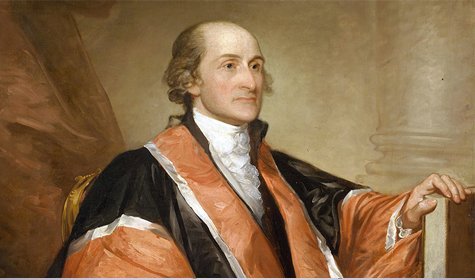John Jay continues his discussion on the importance of maintaining a strong union in order to protect America from foreign aggression in Federalist #4.
Jay’s arguments constitute a subtle defense of the Constitution itself, having established inFederalist #2 the idea that failure to ratify the document would likely mean the end of the union, something the majority of Americans, even Anti-Federalists, did not favor.
In Federalist #3, Jay made the case that a strong, unified federal government would provide the best defense against America becoming involved in hostilities through “just causes of war.” In Federalist #4, he shifts focus and argues the federal government will also provide security by “placing and continuing themselves in such a situation as not to INVITE hostility or insult; for it need not be observed that there are PRETENDED as well as just causes of war.”
Jay begins by pointing out that political leaders often start wars for national gain, and sometimes instigate conflict for mere personal reasons.He then points out several looming areas of conflict facing Americans. He focuses primarily on potential rivalries with England and France, and to a lesser degree Spain. Jay points out that American fisheries, shipping, and trade with India and China all create competition with the European powers, something that could easily lead to conflict.
“The extension of our own commerce in our own vessels cannot give pleasure to any nations who possess territories on or near this continent.”
Jay also notes that Spain and England both maintain strategic positions that allow them to cut the Americans off from the Mississippi River and St. Lawrence.
He then rhetorically magnifies the threat.
“It is easy to see that jealousies and uneasinesses may gradually slide into the minds and cabinets of other nations, and that we are not to expect that they should regard our advancement in union, in power and consequence by land and by sea, with an eye of indifference and composure.”
The solution?
A strong federal government, united against any potential threat.
Jay frames his argument in such a way as to imply this answer is self-evident and accepted by most Americans.
“Wisely, therefore, do they consider union and a good national government as necessary to put and keep them in SUCH A SITUATION as, instead of INVITING war, will tend to repress and discourage it. That situation consists in the best possible state of defense, and necessarily depends on the government, the arms, and the resources of the country.”
Jay then lays out his reasons for favoring a strong national government for to provide defense.
He begins by returning to a theme he introduced in Federalist #2, asserting that the federal government will attract “the talents and experience of the ablest men.” He goes on to argue the national government “can move on uniform principles of policy. It can harmonize, assimilate, and protect the several parts and members, and extend the benefit of its foresight and precautions to each.” Jay asserts that the federal government will consider the interests of the “whole” and not just certain regions. Finally, he points out the benefits of a unified military.
“It can place the militia under one plan of discipline, and, by putting their officers in a proper line of subordination to the Chief Magistrate, will, as it were, consolidate them into one corps, and thereby render them more efficient than if divided into thirteen or into three or four distinct independent companies.”
Jay then uses the power of Great Britain as an example, asking his readers to consider how weak it would be if England, Ireland, Scotland and Wales all operated independently.
“Apply these facts to our own case,” Jay writes. “Leave America divided into thirteen or, if you please, into three or four independent governments…It is easy to perceive how soon they would each dwindle into comparative insignificance.”
Jay closes Federalist #4 with a matter of fact assessment, writing that no matter what America ultimately chooses, “foreign nations will know and view it exactly as it is; and they will act toward us accordingly.”
In Jays view, union under the Constitution bodes well.
“If they see that our national government is efficient and well administered, our trade prudently regulated, our militia properly organized and disciplined, our resources and finances discreetly managed, our credit re-established, our people free, contented, and united, they will be much more disposed to cultivate our friendship than provoke our resentment.”
But Jay insists disunion will diminish America’s stature among the European powers.
“What a poor, pitiful figure will America make in their eyes! How liable would she become not only to their contempt but to their outrage, and how soon would dear-bought experience proclaim that when a people or family so divide, it never fails to be against themselves.”
EDITOR’S NOTE: The following is the fourth in a series of articles giving an introduction to the Federalist Papers, a collection of 85 articles and essays written by Alexander Hamilton, James Madison, and John Jay promoting the ratification of the United States Constitution.
The Tenth Amendment Center is a national think tank that works to preserve and protect the principles of strictly limited government through information, education, and activism. The center serves as a forum for the study and exploration of state and individual sovereignty issues, focusing primarily on the decentralization of federal government power as required by the Constitution. This article originally appeared at: http://tenthamendmentcenter.com/2015/06/08/federalist-4-peace-and-strength-through-union/

